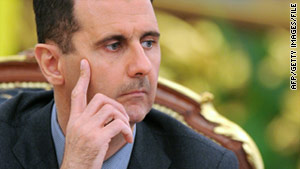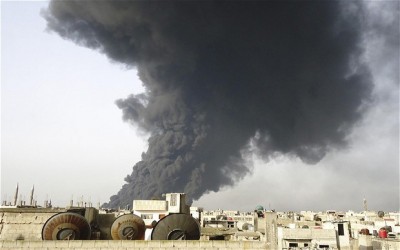 Syrian president Bashar al-Assad has announced a referendum on a draft constitution will be held in less than two weeks, with parliamentary elections to follow within 90 days.
Syrian president Bashar al-Assad has announced a referendum on a draft constitution will be held in less than two weeks, with parliamentary elections to follow within 90 days.
State television reports the new constitution will limit any president to two seven year terms and end nearly five decades of one-party rule in the country.
The Syrian government set up a committee last October to draft a new constitution, which the president declared would go to a vote later this year. The referendum will now be held earlier than expected on February 26.
The new constitution would replace one that enshrines Mr Assad’s Baath party’s hold on power in Syria.
Opposition groups however remain sceptical at repeated promises of political reform.
The chairman of the Movement for Justice and Development in Syria, Anas al-Abda, told ABC1’s Lateline the move is just another “trick in the book”.
Mr Abda, who is also a member of the Syrian National Council, says Mr Assad is trying to divert attention from what is happening on the ground in Syria.
“I think this is just something to divert attention from the war crimes, from the crimes against humanity that the UN High Commissioner mentioned a few days ago,” he said.
Mr Abda says the problem in Syria is not the constitution.
“The constitution was never a problem – because simply it was never respected in the first place, even the existing one,” he said.
“The existing constitution, by the way, enshrines within it the freedom of expression, freedom for speech, the right to demonstrate and all of that. But it’s never been respected.
“And I don’t think proposing a new constitution would make any difference at all.
“I think the problem we have in Syria is that we have a dictatorial regime that controls everything, every aspect of life of the Syrian people, and it has full control over the Army, over the security forces, so whatever constitution, even if you propose the best possible constitution in the world, it will just be papers given to the people and it will never be respected.”
Military assault
The referendum announcement coincides with reports of new military assault by Syrian forces in Homs and Hama and in the capital, Damascus.
Government troops stormed parts of Damascus, firing machine guns in the air, in the closest deployment of troops to the centre of the capital in the 11-month uprising.
In Homs, thick black smoke said to be from a blown-up oil pipeline cast a pall over the city, which has been subject to 12 continuous days of bombardment by government forces.
Many of the wounded have been denied medical treatment in Syria and have been forced to seek help in neighbouring Jordan.

“I was inside my home when I heard shooting. I went out and saw injured on the ground, so we started to carry them and give them first aid,” wounded Syrian Hisham said.
“The security forces tried to arrest us, but we ran away. Then snipers opened fire and shot me twice in my leg.”
Omar, another wounded Syrian added: “We were calling ambulances to rescue us, but they were laughing.”
“Then we figured that they belonged to the regime’s armed gangs and they refused to rescue us.”
On their own
Despite repeated calls for foreign intervention in Syria, there appears to be little or no appetite for it in the international community.
The head of the 57-member Organisation of Islamic Cooperation, Ekmeleddin Ihsanoglu, says any political transformation has to be achieved through diplomatic pressure and talks.
“We are clearly against military intervention in Syria,” he said.
“What happened in Iraq, what happened in Libya, what happened in Somalia a long time ago, what happened in Afghanistan – all these military interventions worsened the position, the conflict, than solved the conflict, and did not bring any good to the people of those countries.”
A fortnight ago, Russia and China vetoed a Security Council resolution condemning the actions of the Syrian government.
But tomorrow, Saudi Arabia and Qatar will sponsor a resolution against Syria in the UN General Assembly.
China and Russia will likely vote against it again, but this time they have no power of veto.
The resolution calls for an end to violence, but does not refer to a proposed joint peace-keeping mission involving the Arab League and the UN.
For now, the citizens of Homs and other cities under attack in Syria are still on their own.
ABC

Leave a Reply
You must be logged in to post a comment.